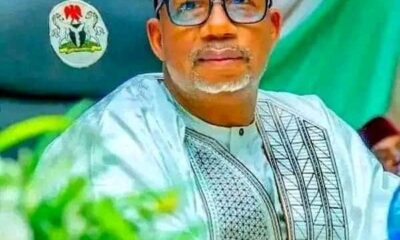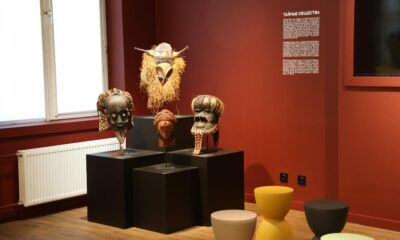Political Issues
The Need To Amend Our Electoral Process (1) -By Eddie Mbadiwe


This contribution has been deliberately delayed out of respect to section 285 subsections 29 of the constitution of the Federal Republic of Nigeria 1999 as amended.
This section provides for the disposal of election petitions within a period of 180 days on which the election petition was filed. Some of the points being canvassed relate to Election tribunals. In keeping with the rule of law therefore it is important that the work of the tribunals is not influenced in any way.
One will attempt to take a holistic and uncluttered look at our electoral processes and hopefully make suggestions for the progress and good governance of our country. Our collective stake is that we have no other country than Nigeria.
To change any fruit, it is imperative that we treat the root of the tree, either chemically or biologically. To effectively change a society, one must operate from the inside. Anyone operating from the outside is nothing but a glorified commentator and a repeater station at best.
That person, with due respect, simply does not understand the ropes.
Every four years, our country comes to a virtual shut-down for a couple of weeks as we go through an electoral cycle whose aim hopefully is to renew and revitalise our democracy. That at least is our goal. An election which normally should end quickly and painlessly in a matter of days gets bogged down with fierce election battles inflicting considerable damage on the participant and more especially to the nation.
One will attempt an overview of the process vis-a-vis the current mantra on change and corruption. To help the discussion, certain assumptions have to be made a-priori. Man by nature is intrinsically selfish, greedy and vain. It is only the strict application and enforcement of laws that has preserved the human society. Again society is continuously reforming, renewing and re-inventing itself. Change, therefore, is in the natural order of life.
Foremost economist, Adam Smith, more than two centuries ago observed that most people are propelled by the law of accumulation – principally of wealth and power. Accumulation is powered by greed. Greed and accumulation give birth to corruption. You can take this as a given.
The other universal truth is that all over the world, money plays a very important part in politics. It has been reported that when young John Kennedy asked his father Joseph, who had been American Ambassador to the court of St. James, what was required for success in politics his reply was money. He asked him for two other requirements but the reply from his father remained the same; money and more money. Without money, don’t even try.
The rider to this, however, is that we must be vigilant and apply stringent laws to control the power of money otherwise it becomes a demon which criminal gangs, like the Mafia, hold countries hostage. Money and power will always walk pari- pasu. Having established the platform, it is now time to address the problem.
A political system in which a holder of Nigeria Certificate of Education (NCE) displaces a Harvard trained professor from parliament calls for introspection. It is a case study for a PhD thesis. The same system in which 300 out of 360 members of the House of Representatives did not return looks more like a revolving door democracy. It has to be examined if such a system is durable enough to lay down roots and bear fruits; bearing in mind that every society gets the government it deserves. These are issues which the National Institute of Legislative Studies must address.
The journey to the next election cycle has started. It started the day the 8th Assembly was inaugurated. That is why we must make hay while the sun is still shining. Days and sometimes weeks before any elections, many Nigerians resident in states other than their state of origin (another unfortunate syndrome in our march to nationhood) return home. They call this home-coming. They do not do this because of their interest or conviction that democracy is still the best form of government fashioned by man. They return because it is their season of harvest. The people are thirsty for raw cash.
The argument which is openly canvassed is that for four years, the constituents have not been settled financially by their representatives. It is absolutely irrelevant how many scholarships and projects that might have been attracted to improve life in the constituency. The election cycle is all about immediate cash. One of our major parties did not help matters by promoting the slogan “share the money”. Many of the candidates have to sell their immovable assets to run the elections.
To show how desperate the situation was, some even went to money lenders. This is the first stage and can be classified as the excavation stage for corruption. The party delegates are the building blocks in the proposed edifice i.eThe National Assembly and all the delegates are commodities for sale.
The so-called party primary elections can be classified as a bazaar or better still an auction in which tickets are sold to the highest bidder. Sometimes, the highest bidder did not get the ticket. But for the benevolence of friends, Nigeria would have been denied the services of President Buhari who said that it was friends that purchased the N27.5m ticket that enabled him contest his party primaries.
If this expenditure was limited to the purchase of ticket, nobody would bat an eyelid. It went much further than that. The national working committees of the two major political parties, APC and PDP are charged as accomplices in the grand design to destroy Nigeria’s democracy. A colleague in the 7th Assembly shared one billion naira to a few members of the national working committee of his party to secure a gubernatorial ticket. He eventually did not get the ticket and till this moment he is yet to get a refund as no receipt was issued. Some other colleagues bribed (for that is what it is) with mind boggling sums to the tune of N300m for House of Representatives ticket. This was denied them as well. These familiar stories are legion and form the butt of jokes in many pepper–soup joints. This system simply denigrates all of us.
In many cases, the panels picked by parties to conduct the primary elections had instructions on whom to deliver thereby making the exercise merely academic to satisfy the electoral law.
The flip side to these shenanigans is that thousands of eminently qualified Nigerians out there are prevented from contributing to our national growth since they do not have the stomach to dare. Consequently, our country is much poorer by their non-participation.
For those who scale through the intra- party skirmish, the next stage which is the main election is full scale war. Professor Jega as INEC Chairman did a good job within what was under his immediate watch but the battle fields are very far from Abuja. The current INEC acting Chairman has complained that INEC (as a co – respondent in all election cases) cannot cope with the astronomical legal fees at tribunals.
To be concluded tomorrow
Dr. Mbadiwe writes from Abuja









